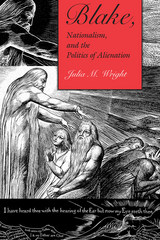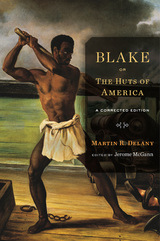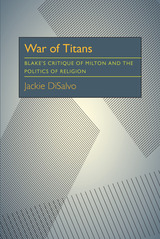
William Blake’s reputation as a staunch individualist is based in large measure on his repeated attacks on institutions and belief systems that constrain the individual’s imagination. Blake, however, rarely represents isolation positively, suggesting that the individual’s absolute freedom from communal pressures is not the ideal. Instead, as Julia Wright argues in her award-winning study Blake, Nationalism, and the Politics of Alienation, Blake’s concern lies with the kind of community that is being established. Moreover, writing at the moment of the emergence of modern nationalism, Blake reveals a concern with the national community in particular.
Beginning with a discussion of the priority of national narrative in late-eighteenth-century art theory and antiquarianism, Blake, Nationalism, and the Politics of Alienation traces its relevance in Blake’s printed works, from The Poetical Sketches and the Lambeth Prophecies to The Laocoön. Professor Wright then turns to Europe, America, and Visions of the Daughters of Albion, focusing on Blake’s portrayals of particular characters’ alienation from the groups and ideologies represented in the texts. The book closes by arguing that Blake’s major printed works, Milton and Jerusalem, are explicit and extensive engagements with the question of nation—and empire.
Although nationalism existed in various forms during the Romantic period, Blake’s contemporaries generally assumed that nations should progress continuously, producing a clear narrative line from an auspicious origin to the perfect fulfillment of that promise. Wright argues that these mutually determining constructs of national character and national narrative inform Blake’s handling of the problem of the individual-within-a-community.

Martin R. Delany’s Blake (1859, 1861–1862) is one of the most important African American—and indeed American—works of fiction of the nineteenth century. It tells the story of Henry Blake’s escape from a southern plantation and his subsequent travels across the United States, into Canada, and to Africa and Cuba. His mission is to unite the black populations of the American Atlantic regions, both free and slave, in the struggle for freedom, whether through insurrection or through emigration and the creation of an independent black state. Blake is a rhetorical masterpiece, all the more strange and mysterious for remaining incomplete, breaking off before its final scene.
This edition of Blake, prepared by textual scholar Jerome McGann, offers the first correct printing of the work in book form. It establishes an accurate text, supplies contextual notes and commentaries, and presents an authoritative account of the work’s composition and publication history. In a lively introduction, McGann argues that Delany employs the resources of fiction to develop a critical account of the interconnected structure of racist power as it operated throughout the American Atlantic. He likens Blake to Upton Sinclair’s The Jungle, in its willful determination to transform a living and terrible present.
Blake; or, The Huts of America: A Corrected Edition will be used in undergraduate and graduate classes on the history of African American fiction, on the history of the American novel, and on black cultural studies. General readers will welcome as well the first reliable edition of Delany’s fiction.

The contributors assembled here, leading exponents of contemporary critical methods as well as close students of Blake, argue the grounds, purposes, and validity of each approach and then apply its method in detailed readings of Blake's works. We see deconstruction, psychoanalytic interpretation, feminist critique, semiotic analysis, Marxist criticism, revisionism, and other methods brought to bear on Blake's texts and into confrontation with one another by those best able to do so.
Through the essays themselves and in the reaction they will certainly provoke, Critical Paths will bring increased theoretical awareness to the study of Blake and will further the ongoing redefinition of Blake's art. At the same time, the collection investigates the general problem of methodology in literary studies by means of a casebook examination of modern critical approaches. Blake criticism and current literary theory here come together; the encounter illuminates and enriches both.

In a dramatically original analysis, Jackie DiSalvo explores Blake’s reworking of Genesis and Paradise Lost in his prophetic poem The Four Zoas, creating a compelling new reading of both Milton and Blake. With informed argument and provocative insights, DiSalvo shows how Blake’s view of history prefigures the revaluation of our own myths of origin prompted by new political, psychological, and feminist perspectives.
READERS
Browse our collection.
PUBLISHERS
See BiblioVault's publisher services.
STUDENT SERVICES
Files for college accessibility offices.
UChicago Accessibility Resources
home | accessibility | search | about | contact us
BiblioVault ® 2001 - 2024
The University of Chicago Press









